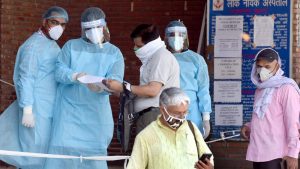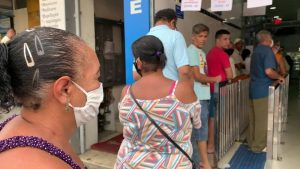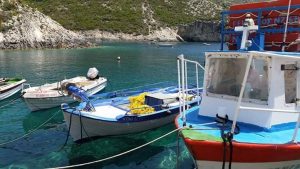WHEN I ARRIVE IN GREECE WILL I NEED TO GO INTO QUARANTINE?

A lot of confusion has arrived whether or not a traveller to Greece has to quaratine. The answer is no UNLESS….
All international travellers arriving to Greece must fill a Passenger Locator Form (PLF) 24 hours before check-in at the latest. It is compulsory by law. If you do not fill out the form you may not be allowed to enter our country.
After completion of the form, each passenger will receive a unique quick response (QR) code. The code will be sent to your mobile phone or you can print it out upon arrival at the airport to screening personnel.
Depending on the QR code, travelers will then be directed either to the exit where they can continue their holiday or to a “screening” area, where they will be tested for COVID-19. Those selected to be tested will still be free to move on immediately to their final destinations as declared in their PLF, where they will have to self-isolate until their test results are available (this should be within 24 hours). The QR codes are based on the information given and the data that has been collected for each individual country.
The 3 colored QR codes.
Green QR code
The person can circulate freely in public places.
Amber QR code
For people recently arrived from other countries, that was recently ill, or are in contact with people that could be ill. They are advised to stay at home for at least 7 days.
In this case there would be no travellers to Greece. We are basically assuming that all visitors are healthy.
Red QR code
People currently affected by the virus. Under medical observation or suspected cases. They must quarantine for at least 14 days either at home or in a government facility.
If the test result is positive, the visitor is classed as RED. They will be notified and quarantined under supervision for 14 days.
If a new Coronavirus case is spotted, the healthcare system can quickly backtrack the movements in public places, identifying people that might have been in contact with the individual.
A Reminder…
The global coronavirus pandemic is ongoing. No travel is risk-free, and disruption is still possible. If you plan to travel:
- read the coronavirus travel guidance to make sure you are prepared for your travel
- read the Travel Advice for your destination, for information on current entry requirements and any local coronavirus measures that you will need to follow
- sign up for email alerts for Travel Advice to ensure you are informed of any changes while you are travelling.

On arrival in Greece our protocol for UK visitors are no different; just bear in mind restrictions could change at any time.
As of today the UK has updated its global advisory against ‘all but essential’ travel, exempting destinations that no longer pose an unacceptably high risk for British travellers. Greece is on that list.
passengers arriving by air:-
- Arrival of passengers at the arrival gate.
- Transfer to the area where screening personnel are located and check the unique quick response (QR) code each passenger shows on their mobile phone screen or printed QR form.
- Screening personnel direct passengers, depending on their QR code, either to the screening area or to the exit (baggage claim area or passport control). Until the screening results become available, passengers tested for the new coronavirus SARS-CoV-2 by a trained health team must self-isolate at the address of their final destination as declared on their passenger locator form (PLF).
- Upon completion of the screening, they are directed towards the exit.
All passengers must comply with all of the necessary preventive hygiene measures (use of masks and physical distancing).

How can I protect myself during my holidays from Covid-19.
Before travelling, pack sanitizing wipes and hand sanitizer with at least 60% alcohol (in case you are unable to wash your hands at your destination). Bring your cloth face covering to wear at times when physical distancing is difficult—for example, while riding on a train or bus, waiting at a rest stop, or riding in a car with people outside your household.
When using any type of transportation, follow these general principles:
- Practice hand hygiene and respiratory etiquette.
- Before you leave, wash your hands with soap and water for at least 20 seconds or use hand sanitizer with at least 60% alcohol.
- Once you reach your destination, wash your hands again with soap and water for at least 20 seconds or use hand sanitizer with at least 60% alcohol as soon as possible upon arrival.
- Avoid touching your eyes, nose, and mouth with unwashed hands.
- Cover your coughs and sneezes with a tissue or use the inside of your elbow. Throw used tissues in the trash and wash your hands immediately with soap and water for at least 20 seconds or use hand sanitizer with at least 60% alcohol.
- Practice social distancing.
- During travel, try to keep at least 6 feet (2 meters) from people who are not in your household — for example, when you are waiting at a bus station or selecting seats on a train.
- Wear cloth face coverings.
- Wear a cloth face covering when physical distancing is difficult.
Note: Cloth face coverings should not be placed on:
- Babies and children younger than 2 years old
- Anyone who has trouble breathing or is unconscious
- Anyone who is incapacitated or otherwise unable to remove the cloth face covering without assistance.
Cloth face coverings are meant to protect other people in case the wearer is unknowingly infected but does not have symptoms.

Taxis, Rideshare, limo for-hire vehicle passengers.
Follow the general principles listed above, plus the following. . .
- Avoid touching surfaces.
- Avoid contact with surfaces frequently touched by passengers or drivers, such as the door frame and handles, windows, and other vehicle parts. In circumstances where such contact is unavoidable, use a hand sanitizer containing at least 60% alcohol as soon as possible afterwards.
- Avoid accepting offers of free water bottles and avoid touching magazines or other items that may be provided for free to passengers.
- Use touch-less payment when available.
- Practice social distancing.
- Limit the number of passengers in the vehicle to only those necessary.
- Avoid pooled rides or rides where multiple passengers are picked up who are not in the same household.
- Sit in the back seat in larger vehicles such as vans and buses so you can remain at least six feet away from the driver.
- Improve ventilation.
Tourists making their way to the Islands.
More than 28,000 travellers arrived on Saturday. Most made their way to the Islands directly. Our authorities commenting that tourist traffic was picking up at all entry points including airports, ports, and on the border.
With this in mind, our Government may decide to boost testing for Covid-19. As from 01st July, thousands of tourists entered our country.
Airports across Greece opened on Wednesday handling flights from across Europe and countries allowed quarantine-free access.
Greece’s government spokesperson Stelios Petsas said health authorities would be heightening testing this month as the number of arrivals increases.
It should be reminded that all travelers are required by law to fill in the PLF form 24 hours ahead of travel. Based on the risk assessment, targeted testing and quarantine are carried out.
Zakynthos Informer would like to wish a warm welcome to our visitors but remember “A safer environment is built on individual responsibility”. Enjoy your holidays and stay safe.
Source:- from:-
 Zakynthos Informer Zakynthos Informer
Zakynthos Informer Zakynthos Informer






